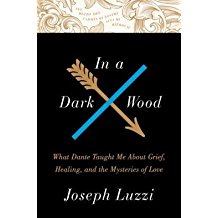 In a Dark Wood: What Dante Taught Me About Grief, Healing, and the Mysteries of Love by Joseph Luzzi, HarperCollins, 2015.
In a Dark Wood: What Dante Taught Me About Grief, Healing, and the Mysteries of Love by Joseph Luzzi, HarperCollins, 2015.
Joseph Luzzi had just started teaching his mid-morning class at Bard College in November 2007 when he saw a security guard standing at his door. “Are you Professor Luzzi? Please come with me.” As Luzzi reached the outside of the building, he heard the words that would forever change his world: “Joe, your wife’s had a terrible accident.”
His eight-and-a-half-months pregnant wife had been involved in a collision between her jeep and a van; while Katherine lay unconscious a medical team performed an emergency caesarean. Forty-five minutes after Isobel was born, Katherine died. As Luzzi puts it, “I had left the house at eight-thirty; by noon, I was a widower and a father.”
I’ve always been fascinated by how events that happen in an instant can have huge, indeed unending consequences. Katherine pulls out into traffic and apparently misjudges the distance; she ends up in a tangle of metal from which she must be extricated by a rescue crew. By the time Luzzi hears about the accident, all that’s left is the aftermath, the grief and loss and mourning, the changes he must make as a new single father, the slow process of healing. There’s no time to adjust to the tragedy, no time to contemplate. He has to figure out a whole host of practical and pressing issues, most of them centered around the baby.
And so Luzzi starts out on his own journey through a dark wood. For years he has loved the poetry of Dante Alighieri, the 13th-century author of the Divine Comedy, a book-length poem telling the story of a journey through the Underworld, from Hell to Purgatory to Paradise. Luzzi structures his own book around those same three sections, using them as metaphors for the stages of grief he passes through. Sounds pretty depressing, doesn’t it? And it could be so, or maudlin, or tedious, or obvious, in lesser hands. But Luzzi is able to weave together his own story, Dante’s actual history, and the fictions of the poem, in a way that brings all three strands to life.
While Luzzi himself is not a Christian, he constantly references Dante’s Christian ideas. One of his, Luzzi’s, preoccupations in the days and weeks after the accident is the question of the soul: Does Katherine still exist, or is she just . . . gone? How can you love someone who no longer has a body? How can you find meaning in a life that suddenly seems meaningless?
I have a bunch of sticky notes marking pages in this book that contain insights I found particularly compelling; over the next few weeks I’ll be writing about these ideas. In the meantime, as always, I would encourage you to read this book. If you think that perhaps I’m overstating the case on its merits, go to this review of the book to see what the professionals have to say about it.